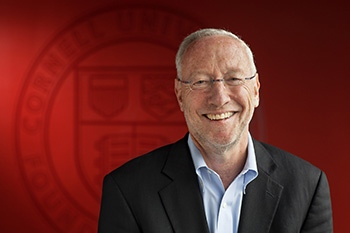END NOTE
The job of the provost: An unbuttoned-down 'shirt-wearer' for Cornell

Provost Michael I. Kotlikoff. See larger image
I am honored to be provost at Cornell – and I know I have just taken on an enormous challenge. While Cornell remains one of the greatest universities in the world, budgets are tight, forcing us to make difficult choices. Moreover, as the legendary historian Carl Becker once said, Cornell professors tend to "think otherwise."
Espousing contrarian views, including disagreeing with deans, provosts and presidents, is the right and the responsibility of the faculty (and sometimes its joy). Great universities benefit from constructive criticism from within and without, but at times a fiercely skeptical view of administration on the part of the faculty presents a challenge to academic leadership and institutional change.
The historical system of governance among the Oglala Sioux Tribe has always struck me as an appropriate analogy for the role of faculty administrators. The Sioux appointed a "shirt-wearer" to preserve order and take into account the views and interests of everyone, including those without much power, but granted little power to compel others' actions. In other words, the title conferred responsibility but limited authority. The shirt-wearer was also proscribed from taking offense when insulted – apparently the Sioux believed that a certain level of abuse comes with the job.
In my view, the provost of Cornell should be a 21st-century, unbuttoned-down shirt-wearer. After all, throughout our 150-year history, Cornell colleges and faculty have excelled because of their independence and independent-mindedness. Central leadership must acknowledge that the excellence of the university derives from individual faculty accomplishments and that a balance between individual and coordinated initiatives is essential to our achievements.
As I begin my term as provost, I am determined to emphasize shared responsibility. Although I must and will make decisions, I will, wherever possible, establish transparency and consultation as preconditions for action. I have taken the advice of colleagues – "get out of Day Hall" – and am meeting with individuals and groups of faculty to learn more about their opinions, concerns and aspirations. Like the shirt-wearers, I intend to bear in mind the needs of the entire community of faculty, staff and students as we deal with challenges both ongoing and new.
One of our most important tasks will be developing a strategic plan to guide us through the next decade. To create this plan we will use a collaborative process to identify institutional priorities and define the best strategies to implement them. Among the areas we will focus on are the curriculum, research priorities and ways to enhance our research, education and engagement goals through closer connections among our New York City, Ithaca and other campuses as well as our international programs.
Meanwhile, along with my faculty and administrative colleagues, I am considering ways to constrain costs and relieve some of the financial pressure we all have experienced. Working with the deans, as well as faculty, staff and students, we will need to make difficult choices as we invest in areas of current strength and future promise. Together with President Elizabeth Garrett, I am committed to fostering and facilitating faculty excellence – hiring and retaining superbly qualified individuals and supporting their research and teaching. I share her conviction that nothing is more important to the university's future.
I am thrilled to serve as Cornell's provost and to work with our dynamic new president – and the independent-minded people of our world-renowned university.
Michael I. Kotlikoff, V.M.D., Ph.D., became provost of Cornell University Aug. 1, 2015. A molecular physiologist, he has taught at Cornell for 15 years and was dean of the College of Veterinary Medicine for eight years before his appointment as provost. While provost, he will continue research related to heart repair in his NIH-funded laboratory. He also hopes to find time to continue to read English and American literature, his undergraduate major at the University of Pennsylvania.